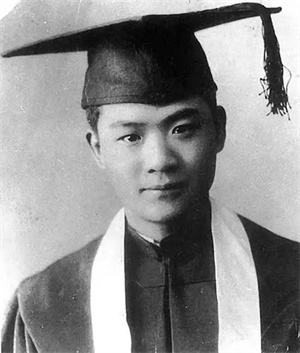◎ 萧 乾 Xiao Qian

枣核
◎ 萧乾
动身访美之前,一位旧时同窗写来封航空信,再三托付我为他带几颗生枣核 〔1〕 。东西倒不占分量,可是用途却很蹊跷。
从费城出发前,我们就通了电话。一下车。他已经在站上等了。掐指一算,分手快有半个世纪了,现在都已是风烛残年。
拥抱之后,他就殷切地问我:“带来了吗?”我赶快从手提包里掏出那几颗枣核 〔2〕 。他托在掌心 〔3〕 ,像比珍珠玛瑙还贵重。
他当年那股调皮劲显然还没改。我问起枣核的用途,他一面往衣兜里揣,一面故弄玄虚地说 〔4〕 :“等会儿你就明白啦。”
那真是座美丽的山城,汽车开去,一路坡上坡下满是一片嫣红。倘若在中国,这里一定会有枫城之称。过了几个山坳,他朝枫树丛中一座三层小楼指了指说:“喏,到了。”汽车拐进草坪,离车库还有三四米,车库门就像认识主人似的自动掀启。
朋友有点不好意思地解释说,买这座大房子时,孩子们还上着学,如今都成家立业了。学生物化学的老伴儿在一家研究所里做营养试验。
他把我安顿在二楼临湖的一个房间后,就领我去踏访他的后花园 〔5〕 。地方不大,布置得却精致匀称 〔6〕 。我们在靠篱笆的一张白色长凳上坐下,他劈头就问我:“觉不觉得这花园有点家乡味道?”经他指点,我留意到台阶两旁是他手栽的两株垂杨柳,草坪中央有个睡莲池。他感慨良深地对我说:“栽垂柳的时候,我那个小子才五岁,如今在一条核潜艇上当总机械长了。姑娘在哈佛教书。家庭和事业都如意,各种新式设备也都有了。可是我心上总像是缺点什么。也许是没出息 〔7〕 ,怎么年纪越大,思乡越切。我现在可充分体会出游子的心境了。我想厂甸,想隆福寺。这里一过圣诞,我就想旧历年。近来,我老是想总布胡同院里那棵枣树。所以才托你带几颗种籽,试种一下。”
接着,他又指着花园一角堆起的一座假山石说 〔8〕 :“你相信吗? 〔9〕 那是我开车到几十里以外,一块块亲手挑选,论公斤买下 〔10〕 ,然后用汽车拉回来的。那是我们家的‘北海’。”
说到这里,我们两人都不约而同地站了起来。沿着草坪旁用卵石铺成的小径,走到“北海”跟前 〔11〕 。真是个细心人呢,他在上面还嵌了一所泥制的小凉亭,一座红庙,顶上还有尊白塔。朋友解释说,都是从旧金山唐人街买来的。
他告诉我,时常在月夜,他同老伴儿并肩坐在这长凳上,追忆起当年在北海泛舟的日子。睡莲的清香迎风扑来,眼前仿佛就闪出一片荷塘佳色。
改了国籍,不等于就改了民族感情;而且没有一个民族像我们这么依恋故土的。
Date Stones
◎ Xiao Qian
Before I set out for the US, a former schoolmate of mine wrote me by airmail, asking me in all earnest to bring him some raw date stones. They were not heavy in weight, yet I was curious about their use.
At Philadelphia, shortly before starting out for my friend’s place, I called him up. So when I got off the train at the destination, I found him already waiting for me at the station. It was about half a century since we last met, and we were now both in our declining years.
After hugging each other, he asked me eagerly, “Have you brought them with you?” I immediately fished out the date stones from my handbag. He fondled them in his palm as if they were something more valuable than pearls or agates.
Obviously he was just as childlike as before. When I asked about the use of the date stones, he put them into his pocket and replied by way of fooling me deliberately, “You’ll understand soon.”
It was really a beautiful mountain city. As we drove on, an expanse of rich crimson up and down the slope came into sight. In China a place like this would have been described as a maple city. After passing through several cols, my friend said pointing to a three-storied house amidst the maple trees, “Here we are.” The car turned into a lawn and when it was three or four meters away from the garage, its door automatically opened as if it recognized its own master.
My friend looked somewhat ill at ease when he told me this: At the time when he bought this big house, his children had all been at school. Now they had their own homes and jobs. His wife, a biochemist, was a dietician at a research institute.
After assigning me a room on the second floor facing a lake, he showed me around his back garden, which, though not too big, was exquisite and nicely arranged. The moment we sat down on a white bench close to a hedge, he asked me, “Don’t you find something here smacking of our native place in China?” At this, I noticed a weeping willow, planted by himself, on either side of a flight of steps as well as a water-lily pond in the middle of the garden. He said with deep feeling, “When I planted the willows, my son was only five. Now he serves as head of chief mechanics in a nuclear submarine. My daughter teaches at Harvard University. I’m happy with my family and my career. I own all modern household facilities I need. But I still feel something lacking. Maybe I’m a bit too foolish. How come the older I become, the more I think of my homeland. Now I fully understand the frame of mind of one residing in a place far away from home. I always think of Changdian and Longfusi. Every time Christmas is celebrated here in America, I think of the lunar New Year back in China. I can never forget the date tree in the courtyard of the house on Zongbu Hutong. That’s why I’ve asked you to bring me some date stones. I’ll try to plant them here.”
Then he said pointing to a jumble of rockery standing in a corner of the garden, “Believe it or not, the rocks, hand-picked by me, were bought by the kilogram. I drove dozens of kilometers away to haul them back in my car. Look, that’s Beihai in our home.”
Thereupon, we rose to our feet simultaneously and walked along a cobbled footpath beside the lawn towards the miniature Beihai. What a careful man my friend was! He had had the artificial hill inlaid with a clay pavilion and a red temple, with a white pagoda on top. He said he had bought the decorative objects from China Town in San Francisco.
He also told me that on a moonlit night he and his wife would sit side by side on the bench recalling how they had used to go boating on the Beihai Lake. Meanwhile, as I smelled the faint scent of the water-lilies carried to us by the breeze, I felt as if the beautiful scene of a Chinese lotus pond were flashing past my eyes.
The change of nationality doesn’t mean the change of national feeling. No other nation has such a strong attachment for the native land as we Chinese.
萧乾(1910—1999),作家、文学翻译家,曾任《大公报》记者,以散文、特写著称。曾任人民文学出版社顾问。《枣核》以平易简洁的文字,叙述一个长期侨居国外的旧时同窗,尽管已改变了国籍,不忘自己是炎黄子孙,一往情深地眷恋故乡故土和本民族。
注释
〔1〕 “再三托付我为他带几颗生枣核”中的“再三”作“恳切”解,不能按字面理解为“一次又一次”或“重复”。因此全句译为asking me in all earnest to bring him some raw date stones,其中in all earnest是成语,作“认真地”或“恳切地”解。
〔2〕 “我赶快从手提包里掏出那几颗枣核”中的“掏出”译为fished out比took out贴切,因前者有“搜寻”的含义。
〔3〕 “他托在掌心”译为He fondled them in his palm,比He held them in his palm贴切,因to fondle表达了原文的内涵“爱抚”。
〔4〕 “故弄玄虚地说”中的“故弄玄虚”作“故意把……搞得神秘化”解,通常可译为deliberately to make a mystery of …。现全句按“故意开玩笑地说”的意思译为replied by way of fooling me deliberately,其中by way of是成语,其意思是“为了”或“意在”(with the intention of)。
〔5〕 “领我去踏访他的后花园”译为he showed me around his back garden,其中to show around是短语动词,作“带领某人参观某地”解。
〔6〕 “布置得却精致匀称”译为was exquisite and nicely arranged,其中nicely的意思是“恰到好处”或“恰恰合适”。
〔7〕 “也许是没出息”不宜按字面直译,现按“也许是自己有些傻”译为Maybe I’m a bit too foolish。
〔8〕 “堆起的一座假山石”译为a jumble of rockery,其中jumble的意思是“杂乱的一堆”。
〔9〕 “你相信吗?”本可译为Don’t you believe it?。现译为Believe it or not,为具有同样意思的常用口头语。
〔10〕 “论公斤买下”即“按公斤计算买下”,译为bought by the kilogram。注意这里介词by和后面的定冠词the属习惯搭配。
〔11〕 “走到‘北海’跟前”译为Walked … towards the miniature Beihai,其中miniature(微型的)是译者添加的成分,用以表达原文中加引号的北海。






